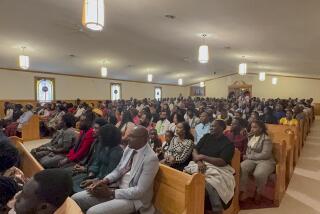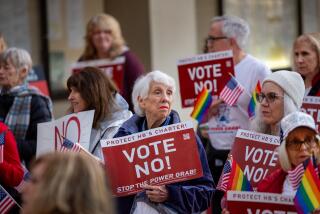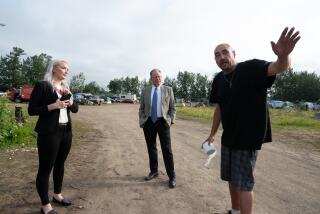Troubled City Looks to Build Homes, Hope
BENTON HARBOR, Mich. — Tommy Ray sat on his stoop, sipping a soda, and cautiously watched construction crews Sunday haul stacks of wooden planks and building supplies down the street.
For years, his neighbors have fled Buss Avenue, leaving this economically depressed southwestern Michigan town to find work and opportunity elsewhere. Again and again, residents have picked up scrap wood to board up the empty buildings’ windows and doors, less than two miles from where racial strife in 2003 attracted national attention to the town’s plight.
Now, former President Carter, his wife, Rosalynn, and an estimated 1,500 volunteers from Habitat for Humanity International have gathered to help Benton Harbor: In the next week, they plan to build 20 homes.
It’s part of the organization’s effort, which begins today, to finish about 230 houses throughout Michigan by Friday.
“We’ve come here to work. Let’s work!” Carter, 80, told hundreds of cheering volunteers Sunday at an opening ceremony at Lake Michigan College’s Mendel Center.
The houses are one of the many steps, some more modest, being taken to improve this town of about 11,200 people about 100 miles northeast of Chicago. But even as Benton Harbor is slowly coming back to life, residents such as Ray fear that improvements may be arriving too late.
In recent months, police in riot gear repeatedly have been called to break up fights and control unruly crowds.
The Benton Harbor government has wrestled with a scandal-tinged recall election to unseat a city commissioner. A judge ruled the results invalid because of voter manipulation. And an activist was arrested and charged with manipulating absentee ballots and paying residents $5 each to vote.
“I think the new houses are a great opportunity, and it makes the neighborhood look good,” said Ray, 50, a city maintenance foreman. “But there’s still so much happening that’s wrong, and people are mad. I’m afraid things are going to be worse than they were in 2003.”
Two years ago, after a black motorcyclist was killed in a police chase, angry residents spent two nights roaming the streets, throwing bricks and setting fire to more than two dozen buildings.
Simmering racial tension and mistrust of authorities have plagued this town since long before the 2003 uprising. Nestled on the shore of Lake Michigan, Benton Harbor and its “twin city” neighbor, St. Joseph, have for years had stark economic and racial divisions.
More than 90% of St. Joseph’s 8,700 residents are white. Unemployment is less than 4%.
About 90% of the population in Benton Harbor is black, and half the town’s residents don’t have a high school diploma. Unemployment traditionally hovers at about 30%, according to local and state economists.
But the employment picture is slowly improving, the economists say. A survey by Manpower Inc. this year found that 37% of the companies in Benton Harbor and St. Joseph planned to hire this year.
The state launched a program to train local residents for high-tech and other skilled work and help draw private investments to boost business.
Along downtown’s wide streets, volunteers have been collecting trash that litters dozens of empty lots. Artists, funded by the Michigan-based W.K. Kellogg Foundation, have begun work on four murals to be painted on brick building exteriors. One, a pastel-colored glimpse of Benton Harbor’s past, is complete: A worker labors as boats and tourists arrive at its port.
Atlantic Automotive Components, which makes interior car parts, plans to expand its facilities and hire several dozen more workers. Ace Companies LLC, a scrap metal broker, is reopening a manufacturing facility and converting it back into an aluminum-smelting plant.
A home decor shop based in St. Joseph has transformed one of its brick warehouses in Benton Harbor into a high-end showroom. A Chicago landscape architect has bought a brick commercial building with plans to expand. Three new restaurants -- a Mexican cafe, a wine-tasting bistro and a microbrewery -- are set to open in the next few months.
Leslie Pickell, a management consultant from Chicago, has pooled her money with several partners to buy a 100-year-old livery stable. They began planning how to transform the building into a microbrewery three days before 27-year-old Terrance Shurn died in the June 2003 police chase.
“When the [riots] happened, it was real dramatic,” said Pickell, co-owner of the Livery Brew Pub. “But I fell in love with the area. There was no way I was going to leave. Ever since then, it seems like things are slowly turning around.”
Hoping to speed up that improvement is what attracted the Carters to the Benton Harbor area, said Paul Leonard, chief executive of Habitat for Humanity International. The Carters plan to split their time between Benton Harbor and Detroit this week.
“It’s given us hope to see someone important care about us,” said Monica Nichols, 24, who moved to Benton Harbor with her family eight years ago. “Most people, though, are too afraid to believe too much. We’re waiting to see what else comes.”
Some residents say that blacks still see many of the improvements as out of their reach, and that their hopes for a better future remain as bleak as Benton Harbor’s ongoing political and social strife.
In February, City Commissioner Glenn Yarbrough was recalled by a vote of 297 to 246. Almost half of the votes were cast by absentee ballot.
Edward Pinkney, leader of the Black Autonomy Network Community Organization, helped bring about the recall vote. The group, which repeatedly criticized the Benton Harbor Police Department for allegedly ignoring black residents’ civil rights, was angry at Yarbrough’s support of the Police Department.
But Berrien County prosecutor James A. Cherry filed a civil suit against the city and City Clerk N. Jean Nesbitt to nullify the election results, amid allegations that voters had been improperly influenced by Pinkney.
During the trial, witnesses testified that Pinkney had paid them to vote and told them the absentee ballots were job applications. Some testified they couldn’t read and had believed they were voting for jobs to come to the city.
Berrien County Trial Court Judge Paul L. Maloney overturned the election results.
“To my knowledge, there is no reported case in our state that contains anywhere near this breadth of wrongdoing,” Maloney said in his April ruling.
Another recall election is scheduled to be held in August. Nesbitt was fired.
Pinkney, 56, was arrested in April and charged with five counts of election fraud. Pinkney, who was convicted in 1999 in Berrien County for stealing funds from retirees in an insurance scandal, has been released on bond and is awaiting trial.
Pinkney could not be reached for comment Sunday.
In early May, nearly 150 young people -- most from Benton Harbor, according to police -- gathered and egged on a series of fights at a city festival in St. Joseph. As authorities tried to break up the crowd, the youngsters began screaming profanities and throwing trash.
One Berrien County sheriff’s deputy was hit with a bottle, slicing open her forehead. Two minors were arrested: One was charged with aggravated assault, and the other with disorderly conduct.
Authorities said most people in the crowd were 16 or younger.
The following day, angry residents gathered along May Street in Benton Harbor. For more than an hour, police said, people shouted at each other and blocked cars. Several residents reported guns being fired. More than 80 officers from local and regional agencies were called to break up the scene.
“Right now, we’re all just hoping for a quiet summer,” said Mike Wolfe, co-owner of the newly opened home decor store, the Iron Gate. “Though the way things have been going lately, it could go either way.”
More to Read
Sign up for Essential California
The most important California stories and recommendations in your inbox every morning.
You may occasionally receive promotional content from the Los Angeles Times.










